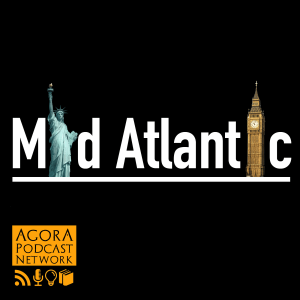
Mid-Atlantic - conversations about US, UK and world politics
Society & Culture

In this episode of Mid Atlantic, dissects Iran's intricate power structures and its enduring protests, with significant implications for both Iran and the broader Middle East. The discussion pivots around the death of Ebrahim Raisi, Iran's president, Ayatollah Ali Khamenei, Iran's Supreme Leader since 1989. The episode features insights from Jason M. Brodsky, policy director of United Against a Nuclear Iran, and Henrik F. Rasmussen, executive director of the Institute for Science and International Security.
The guests delve into the workings of the morality police, the enforcement of Islamic dress codes, and their impact on civil liberties. They also explore the Islamic Revolutionary Guard Corps' (IRGC) role in Iran's political and military strategies and Iran's technological and nuclear capabilities. Jason provides a comprehensive overview of Khamenei's rise to power, his extensive bureaucratic reach, and the supreme leader's strategic decisions. He also elaborates on the Iranian protests following the death of Mahsa Amini, the persistent dissatisfaction among the Iranian populace, and the cyclical nature of protests against the regime.
Henrik offers a detailed analysis of Iran's nuclear ambitions, the JCPOA nuclear deal, and the international community's divided stance on Iran's nuclear program. He highlights Iran's technological advancements in missile and drone technology and its strategic cooperation with Russia, posing significant implications for regional and global security. The episode concludes with discussions on the "axis of resistance," Iran's alliances with militant groups like Hezbollah, Hamas, and the Houthis, and the strategic interplay between Iran, Russia, and other regional actors.
- "Khamenei has been the glue of the system, holding it together through his extensive bureaucratic reach and strategic decisions." — Jason M. Brodsky
- "Iran's youth are completely alienated from this system, yearning for a different life free from oppression and economic hardship." — Jason M. Brodsky
- "Iran's nuclear program claims to be civilian, but the facts on the ground suggest a clear military intent." — Henrik F. Rasmussen
- "The axis of resistance is designed to encircle Israel in a ring of fire, exhausting its resources and deterring its operations." — Jason M. Brodsky
- "Iran's cooperation with Russia extends beyond military support, impacting European security through technological exchanges and nuclear developments." — Henrik F. Rasmussen
- United Against Nuclear Iran
- Institute for Science and International Security
- JCPOA (Joint Comprehensive Plan of Action) Overview
- International Atomic Energy Agency (IAEA) Reports on Iran
Hosted on Acast. See acast.com/privacy for more information.
More Episodes
 2024-09-15
2024-09-15
 2024-08-05
2024-08-05
 2024-07-24
2024-07-24
 2024-07-18
2024-07-18
 2024-06-29
2024-06-29
 2024-06-25
2024-06-25
 2024-06-12
2024-06-12
 2024-05-31
2024-05-31
Create your
podcast in
minutes
- Full-featured podcast site
- Unlimited storage and bandwidth
- Comprehensive podcast stats
- Distribute to Apple Podcasts, Spotify, and more
- Make money with your podcast
It is Free
- Privacy Policy
- Cookie Policy
- Terms of Use
- Consent Preferences
- Copyright © 2015-2024 Podbean.com





